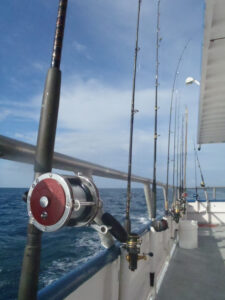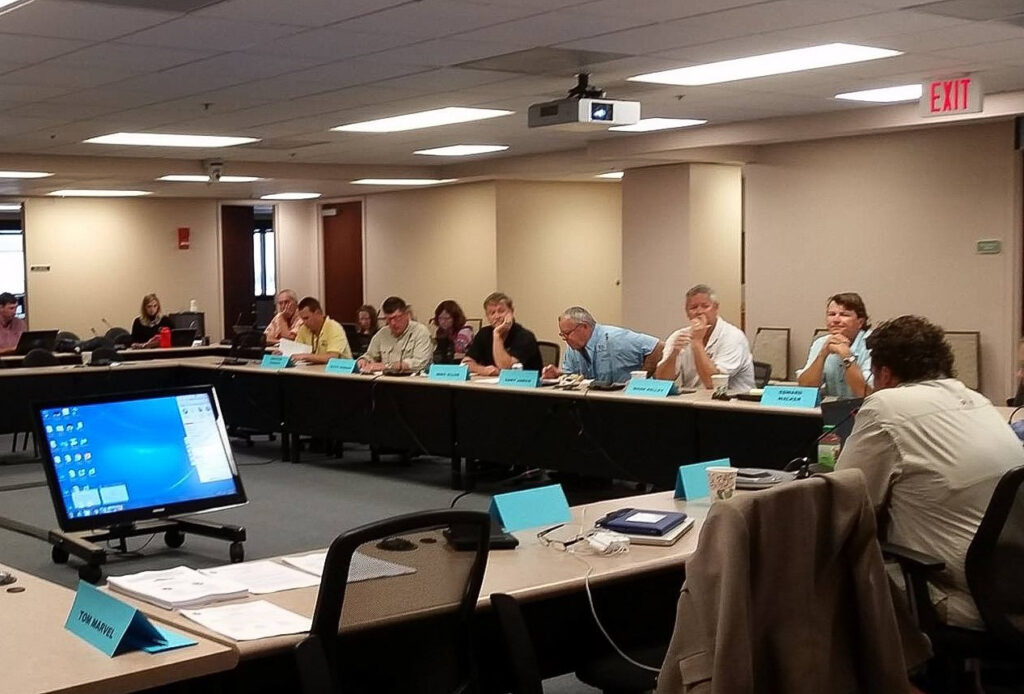
What are Scientific and Statistical Committees?
Scientific and Statistical Committees (SSCs) are comprised of professionals with education and expertise in a variety of fields such as biological, ecological, quantitative analyst/modelers, economic, and social sciences. SSCs provide the Council with ongoing scientific advice for fishery management decisions, including recommendations for preventing overfishing and achieving rebuilding targets, and reviews of reports on stock status and health, bycatch, habitat status, social and economic impacts of management measures, and sustainability of fishing practices. The SSC also provides a recommendation to NOAA fisheries regarding or not the scientific products reviewed by the SSC are consistent with the best scientific information available (BSIA), and may inform evaluations about the effectiveness of the measures in achieving management objectives.
For each managed stock or assemblage of stocks, the SSCs recommend an overfishing limit (OFL) and acceptable biological catch (ABC) and that considers scientific uncertainty. The Council cannot establish an annual catch limit (ACL) that exceeds the ABC. The SSCs may also comment on the scientific and technical merits of accountability measures if ACLs are exceeded; managers can then consider these comments when making management decisions.
The emphasis of the SSC lies in evaluating and interpreting scientific data and products, upon which management measures are based; the SSC does not select management measures outside of the OFL and ABC. The SSC evaluates the issue, the data and related analyses available on that issue, and the appropriateness of those data and analyses at addressing the issue. The SSC may request data and analyses to be generated to better inform the Council about the scientific facets of an issue, with the ultimate directive of its recommendations being consistent with the Best Scientific Information Available.
How do I Become a SSC Member?
The Council solicits applications for re-population of its SSCs every three years. Applicants will fill out a survey identifying their field of study, provide a resume or curriculum vitae, and details regarding their professional qualifications and experience.

What are the Responsibilities of a SSC Member?

SSC members are appointed for three-year terms with no term limits. SSC members are expected to review materials, attend in-person meetings, and participate in discussions to make recommendations to the Council. SSC members are also expected to participate in the SEDAR process as they are able and as appropriate, given their fields of expertise. The elected chair of the SSC will be asked to review meeting summaries, chair SSC meetings, and travel to Council meetings to report SSC recommendations and assist in answering the Council’s questions. SSC members will be reimbursed for their, travel, lodging, and meal costs associated with each meeting. Eligible SSC members can also receive a stipend for their meeting time.
Can Anyone Apply to be a SSC Member?
SSC applicants should be, in no order of priority, federal employees, state employees, academicians, or independent experts with strong scientific or technical credentials, and experience. Consideration for appointment may include the appropriate field of experience and expertise, and past attendance and participation during meetings. SSC members must also provide Statements of Financial Interest disclosures prior to and annually after the appointment process. These forms are posted on the Council’s website and are subject to disclosure and recusal provisions contained in the Magnuson-Stevens Fishery Conservation and Management Act.

How do SSCs Function?

SSC members typically are notified when the Council plans to convene a meeting and provided a draft agenda. Each meeting will be scheduled to allow for the most participation from its membership, and is considerate of presenter availability. SSCs will be given a meeting agenda, briefing materials, and travel instructions to prepare for each meeting. The SSC is typically convened 4-5 times per year for 2-3 days depending on the topics and materials available for a particular meeting. The meetings are chaired by an elected SSC member and the group operates using parliamentary procedure. Council staff work with the SSC to prepare and present appropriate background materials. SSC meeting outcomes are summarized by Council staff and reported to the Council by the SSC Chair or their proxy, who must be an SSC member who attended the meeting being reported.
